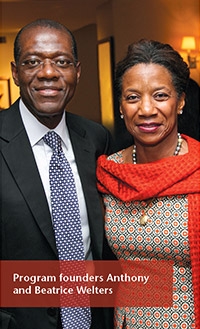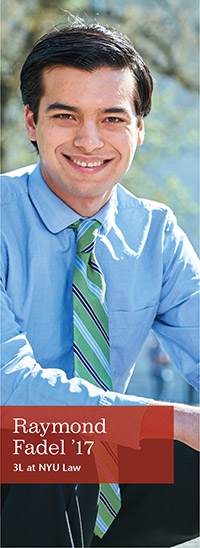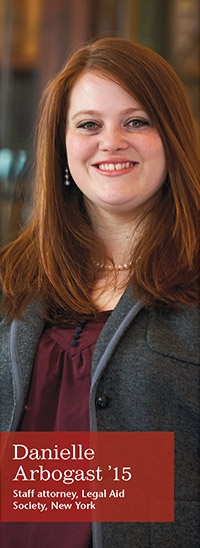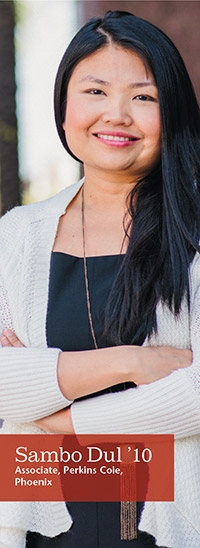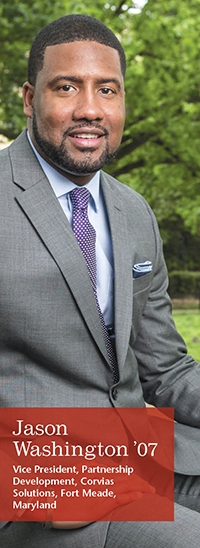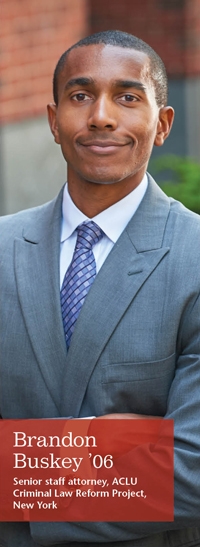Milestones
As one of its graduates becomes the first Latina partner at Cravath, Swaine & Moore, the AnBryce Program awards its 100th scholarship.
BY MICHAEL OREY
PHOTOGRAPHS BY BRYAN THOMAS, TRAVIS NEELY, AND MARK FINKENSTAEDT
Making partner is always something to celebrate, but for Damaris Hernández ’07 it was particularly sweet and significant. She is the first Latina to reach the exalted ranks at Cravath, Swaine & Moore, among the bluest of blue-chip firms, and she has overcome huge odds to do so. Her achievement—and the critical role the AnBryce Scholarship Program played in it—was featured on the front page of the New York Times Business section earlier this year.
“When I was the only one of color or the only woman in the room, I had the confidence to believe in my ability,” Hernández told Times reporter Elizabeth Olson, describing the advantages of AnBryce. “When you are the first, you need someone to have your back.”
Founded in 1998 by Anthony Welters ’77, chairman of the Law School’s Board of Trustees, and his wife, Ambassador Beatrice Wilkinson Welters, the AnBryce Program is all about having the backs of students who have faced challenging social and economic circumstances and are among the first in their immediate families to pursue a graduate or professional degree. The support begins with a full-tuition scholarship, but includes much more.
“We don’t simply hand people a check,” explains Anthony Welters. “We call it a program, and it really is: there’s extensive mentorship and community building that helps AnBryce Scholars navigate law school and get launched on a career path.”
Just ask Hernández, who grew up helping her parents run their Brooklyn bodega. Her father died just before she left for college at Harvard, and her mother lost the store two years later. When Hernández was accepted at NYU Law, she was supporting her family. An AnBryce Scholarship made it financially possible for her to attend, but the realm of elite law firms was something with which she had no acquaintance. “We didn’t sit around reading the New York Times or Wall Street Journal in my house,” she says, “so I had no familiarity with things like complex civil litigation, or the operation of multinational corporations.”
When Hernández applied for a job at Cravath, Evan Chesler ’75 was one of the partners who interviewed her, and he subsequently worked with her on litigation. (Now Cravath’s chairman, Chesler is a trustee of the Law School and of NYU.) “I knew from the moment I met Damaris that she was a person of enormous ability and potential,” says Chesler, “and the AnBryce Program enabled her to demonstrate that to others. She’s an extraordinarily talented lawyer.”
“Given the backgrounds of most AnBrycers, navigating entry into the legal profession is very daunting,” Hernández observes. “I think the program allows us access to resources that we wouldn’t otherwise have, a support network that we sometimes are missing, and it just bridges the gap between where we come from and where we want to be.”
The AnBryce Scholarship, which helped set Hernández on her path to a Cravath partnership, was initially offered to a single incoming student a year. With additional funding, the program expanded to support up to 10 in each class, and last year named its 100th recipient. Here are brief portraits of some of them.
Raymond Fadel '17
Summer jobs at large law firms are typically for students who have completed their 2L year, but the AnBryce Summer Associate Program (ASAP) helps scholarship recipients get a running start by placing them in these positions after their first year. Raymond Fadel ’17 recalls going to his first ASAP interview at Paul, Weiss, Rifkind, Wharton & Garrison in midtown Manhattan.
“I walked into a skyscraper that looked like something from a movie, and the surrealness of it struck me. I remember having to stop myself and saying, ‘This is happening to me! I’m not here as a tourist, I have a business purpose here.’” He got the job, and returned to Paul Weiss following his 2L year as well.
The bustling streets and grand office towers of Manhattan stand in sharp contrast to Fadel’s hometown of Niagara Falls, New York. While growing up there, Fadel says, he saw the town slide into economic decline as factories closed and unemployment soared. The bar his father ran became a rougher place, and Fadel’s older brother, who took it over, was murdered there when Fadel was a high school freshman. A year later, his mother, an alcoholic who had been divorced from his father since Fadel was seven, died of liver failure. She was, he says, “a beautiful and passionate Iroquois woman whom I never really knew.” Two weeks into Fadel’s senior year, his father succumbed to a rare disease. “My response to all these things was to commit myself to my schoolwork,” he says. When he won a full scholarship to Harvard University, it garnered a headline story in the Buffalo News.
Fadel says he had learned the “pivotal role” that lawyers can play in people’s lives through his own experience—his parents’ divorce; the prosecution of his brother’s killer; the handling of his father’s estate—and this led him to want to be a lawyer himself. “The AnBryce Program offers you a road map to pursue your dreams,” Fadel says. “They put powerful people behind you, but they also provide an adoptive family to give you that sense of community that fills a void you may have. It does a lot to make you feel less alone.”
Danielle Arbogast '15
“I sincerely think I have the best job in the legal field,” says Danielle Arbogast ’15 of her position as a public defender with the Legal Aid Society in Queens, New York. “I love going into work every day.”
Arbogast decided at an early age that she wanted to be an attorney with a specific focus on criminal defense work. Growing up in Chesapeake, Virginia, she attended the poorest of the city’s several high schools. “You really got to see the economic inequality,” she says. And with friends who found themselves or family members in encounters with the criminal justice system, she came to understand the failings of the system and the resulting impact on the community. The first person in her family to attend college, she enrolled at NYU Law after graduating from the University of Pittsburgh.
“The AnBryce Program was the defining element of my law school education,” Arbogast says. “The people who invest in the program”—faculty members, alumni, judges, and others—“really invest in it. They give tremendous time and support, come to programs where they tell us their stories, give us their e-mail addresses. It’s kind of a weird feeling to have gone through life struggling to get by and then being in this position of honor.” (Arbogast held a named scholarship within the AnBryce Program: the Jacob Marley Foundation Scholarship in Memory of Christopher Quackenbush ’82.)
Law School Convocation involved more than just a graduation ceremony. Anthony and Beatrice Welters “threw this really spectacular reception” for AnBryce Scholars, family members, and program supporters, Arbogast recalls. “It was a really wonderful experience that kind of encapsulated our program—it was a celebration of our success, it was a celebration of our group effort, and it was a celebration of the people who were so helpful in getting us to this point. I think that’s the moment you really feel that this is a family that’s going to live beyond the three years of law school.”
Sambo Dul '10
Following nearly two years at Sullivan & Cromwell in New York and a clerkship with Chief Judge Theodore McKee of the US Court of Appeals for the Third Circuit, Sambo Dul ’10 returned home to Arizona, where she is an associate in Perkins Coie’s Phoenix office. Her experience there has included anticorruption investigations and compliance counseling, criminal defense and investigations, and commercial litigation. She also devotes significant pro bono time to immigrant rights matters and serves on her firm’s Pro Bono Committee. Additionally, she founded Youth Adelante, a nonprofit organization that provides housing support and mentoring to unaccompanied immigrant youth following release from federal detention facilities.
The plight of those forced from their homelands is something Dul knows firsthand. Born in Cambodia, she, her mother, and three siblings spent four years in a refugee camp before being resettled in Phoenix. Her father and numerous other family members had died in Cambodia. Dul attended Arizona State University on a full scholarship, but still worked part time to help support her family.
Dul chose to attend NYU Law in good part because she met Anthony Welters at an admitted students’ day. “I was extremely impressed by his commitment and humility, and the vision he had for the AnBryce Program,” she recalls. “I was torn between Harvard and NYU; AnBryce and Tony tipped the scale.” During law school, AnBryce offered a support network. “I always had people to turn to with questions about navigating academic or career decisions,” Dul says. “That was invaluable, because I was the first person in my family to graduate from college or attend law school.”
Dul was an articles editor on the Law Review and obtained a joint degree from Princeton (a master’s in public affairs), but the study of immigration law stands out in her law school experience. Taking both the Immigrant Rights Clinic and Advanced Immigrant Rights Clinic taught by Professor of Clinical Law Nancy Morawetz ’81 “was the most challenging, rewarding, and influential experience for me in law school,” Dul says. “Nancy taught me how to be an effective, creative, and compassionate advocate. I still carry those lessons with me.”
Jason Washington '07
The versatility of a JD is evident in the career of Jason Washington ’07, who has moved from private law practice to government to business. After three years as an associate in the corporate group at Kirkland & Ellis in New York, he served as a senior policy adviser in the Mayor of Baltimore’s Office of Government Relations and then spent a year as a White House Fellow. Currently, Washington is vice president at Corvias Solutions in the Washington, DC, area, where he works with cities and counties to solve systemic infrastructure problems through development of public-private partnerships.
Washington overcame a number of obstacles before finding the path to success. Raised primarily by his mother in Texarkana, Texas, he grew up struggling to overcome a speech impediment and with “a lack of understanding about academic achievement.” But he also spent a lot of time on his grandparents’ farm outside of Texarkana, where he learned “grit and determination.” Admitted to the University of North Texas on probation, he successfully completed required remedial classes and, after two years, transferred to Morehouse College in Atlanta, where he majored in biology. He spent two years teaching middle school with Teach for America in Houston and obtained a master’s in education.
Law school offered its own challenges, and the support of the AnBryce Program was critical. “I can say quite frankly, had I not been an AnBryce student, I would not have attended NYU, and I definitely feel like I would have floundered,” Washington says. “It’s very rare from the first day of class to know that there were people you could rely on—for people like Tony and Bea to make clear that ‘my Rolodex is yours.’ It was extremely motivational to have someone who doesn’t really know you believe in you and make you feel that you should have the same confidence in yourself.”
Convocation stands out in his memory: “Receiving my degree from Bea Welters and having her say, ‘Congratulations, we’re so proud of you.’ It was like having my family telling me the same thing.”
Brandon Buskey '06
Born in North Carolina, Brandon Buskey ’06 has never fully left the South. After a federal court clerkship in Connecticut, he spent four years in Montgomery, Alabama, as a staff attorney at the Equal Justice Initiative (EJI) representing death row inmates and children sentenced to life without parole. (Professor of Clinical Law Bryan Stevenson founded and directs EJI.) Now Buskey is a senior staff attorney with the ACLU Criminal Law Reform Project in New York, working on litigation aimed at bail and right-to-counsel reform. With much of that litigation focused in southern states, he travels often to Mississippi and Alabama.
Raised by a single mother in Fayetteville, North Carolina, Buskey recalls that “there wasn’t a lot of money, but I always felt I had the freedom to do the kinds of things I wanted to do.” Because his mother left college to raise him, Buskey became the first member of his family to obtain a college degree. He attended North Carolina State University on a full scholarship and graduated with a BA in psychology and as class valedictorian. After being accepted to NYU Law, he was awarded both Root-Tilden-Kern and AnBryce Scholarships.
When visiting the Law School, Buskey and some other admitted students were taken to dinner at an Italian restaurant on MacDougal Street, and then for a night on the town by two upperclass AnBrycers (Sheridan England ’04 and Leila Thompson ’05). “I was amazed at their willingness to spend that kind of time with us,” he says, “and that continued to be the case with both of them and others, like Bea and Tony Welters, while I was in law school.”
Buskey says that, beyond the financial assistance, “it really comes down to the individuals involved in the program” and the help and encouragement they provided. “There were all these folks who asked, ‘Hey, what is it you want to do after law school?’ without any restrictions on what that might be.”
Sidebar: Leading Lights Show the Way
AnBrycers say that one of the main benefits of the program is that it introduces them to people in the worlds of business and law practice who serve as sources of inspiration and mentors. In part this is done through the Leading Lights Speaker Series, which invites executives and others to share their personal stories. Recent guests have included Kenneth Langone, co-founder of Home Depot; Clarence Otis Jr., former chairman and chief executive officer of Darden Restaurants; and Marianne Short, executive vice president and chief legal officer of UnitedHealth Group.
“I was always impressed and humbled that such incredible professionals took time out of their busy schedules to meet with us,” says Danielle Arbogast ’15. “I believe every speaker in the series gave us their personal contact information and urged us to reach out if they could ever be of any assistance. The network that this program fosters is an incredible way for the scholars to orient ourselves in a professional world that can feel very unfamiliar and unwelcoming at times. A common theme in the series was that none of the speakers felt that they would have reached their level of success without good mentors and support networks. I think that’s a great message for law students, and it’s something I’ve gone back to frequently now that I’m in my first year of practice.”
Posted September 2, 2016


